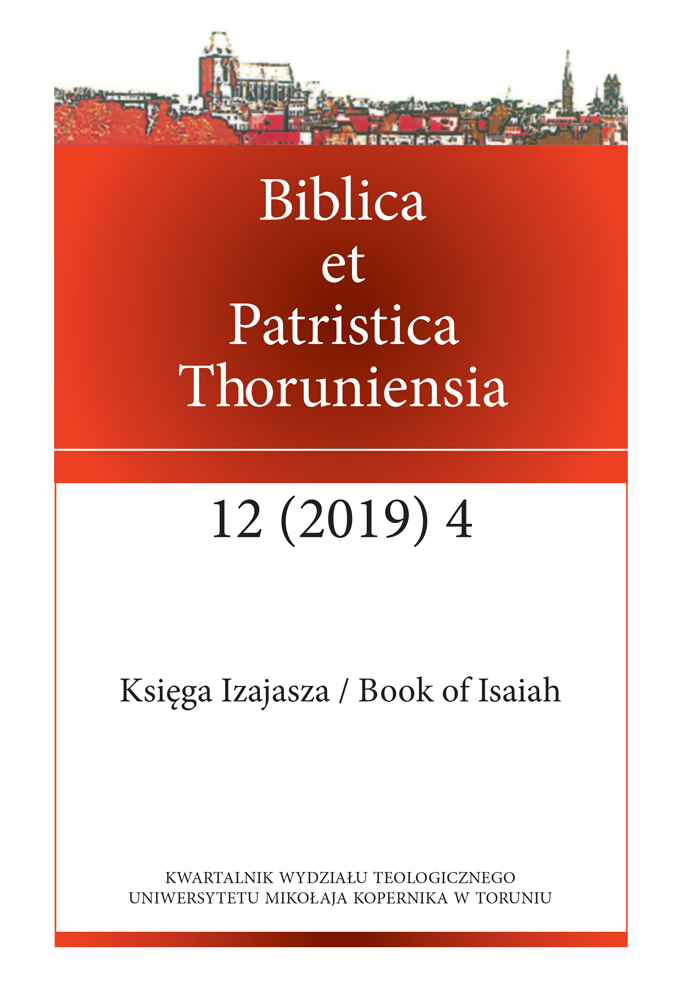The pathos of the Accusation. Analysis of communicative strategy in Is 57,3–13
DOI:
https://doi.org/10.12775/BPTH.2019.021Schlagworte
Isaiah, Rib, PragmaticsAbstract
With its characteristic articulation of accusation and sanction, and with its purpose of reconciliation, the procedure of the rîb is the conceptual framework of Is 57,3-13. God represents the injured party who initiates the fight on the juridical grounds of mutual belonging that binds him to Israel. He perceives as a grave injustice the violation by his people of this filial and spousal relationship. The purpose of his way of proceeding is not, though, simply the announcement of a clear and definitive condemnation, but the recovery of the relationship itself. This scope determines the communicative form of the divine discourse, which from its first lines is anything but neutral. So in Is 57,3-13, the reader is called to interpret and evaluate the performative element of the discourse of God and its finality.Literaturhinweise
Austin J.L., How to Do Things with Words, Oxford 1962.
Bovati P., Ristabilire la giustizia, Analecta Biblica 110, Roma 1986.
Brongers H.A., “Some Remarks on the Biblical Particle halô´”, Oudtestamentische Studiën 21 (1981) 177–189.
Grilli M., Guidi M., Obara E.M., Comunicazione e pragmatica nell’esegesi biblica, Lectio 10, Roma 2016.
Irwin W.H., “The Smooth Stones of the Wady?” Isaiah 57,6, Catholic Biblical Quarterly 29 (1967) 31–40.
Lausberg H., Handbuch der literarischen Rhetorik, München 1960.
Lewis T.J., Cults of Dead in Ancient Israel and Ugarit, Harvard Semitic Monographs 39, Atlanta GA 1989.
Obara E.M., “Le azioni linguistiche: l’influsso del testo sul contesto”, in M. Grilli, Guidi M., Obara E.M., Comunicazione e pragmatica nell’esegesi biblica, Lectio 10, Roma 2016, 84–117.
Pauritsch K., Die neue Gemeinde: Gott sammelt Ausgestossene und Arme (Jesaja 56–66). Die Botschaft des Tritojesaja-Buches literar-, form-, gattungskritisch und redaktiongeschichtlich untersucht, Analecta Biblica 47, Roma 1971.
Polan G.J., In the Ways of Justice Toward Salvation. A Rhetorical Analysis of Isaiah 56–59, American University Studies: Series VII. Theology and Religion, New York–Berne–Frankfurt am Main 1986.
Searle J.R., Speech-Acts. An Essay in the Philosophy of Language, Cambridge 1969.
Spronk K., Beatific Afterlife in Ancient Israel and in the Ancient Near East, Alter Orient und Altes Testament 219, Neukirchen–Vluyn 1986.
Young E.J., The Book of Isaiah, vol. III: Chapters 40 through 66, New International Biblical Commentary, Grand Rapids, MI 1969.
Downloads
Veröffentlicht
Zitationsvorschlag
Ausgabe
Rubrik
Lizenz
CC BY ND 4.0. Posiadaczem prawa autorskiego (Licencjodawcą) jest Autor, który na mocy umowy licencyjnej udziela nieodpłatnie prawa do eksploatacji dzieła na polach wskazanych w umowie.
- Licencjodawca udziela Licencjobiorcy licencji niewyłącznej na korzystanie z Utworu/przedmiotu prawa pokrewnego w następujących polach eksploatacji: a) utrwalanie Utworu/przedmiotu prawa pokrewnego; b) reprodukowanie (zwielokrotnienie) Utworu/przedmiotu prawa pokrewnego drukiem i techniką cyfrową (e-book, audiobook); c) wprowadzania do obrotu egzemplarzy zwielokrotnionego Utworu/przedmiotu prawa pokrewnego; d) wprowadzenie Utworu/przedmiotu prawa pokrewnego do pamięci komputera; e) rozpowszechnianie utworu w wersji elektronicznej w formule open access na licencji Creative Commons (CC BY-ND 3.0) poprzez platformę cyfrową Wydawnictwa Naukowego UMK oraz repozytorium UMK.
- Korzystanie przez Licencjobiorcę z utrwalonego Utworu ww. polach nie jest ograniczone czasowo ilościowo i terytorialnie.
- Licencjodawca udziela Licencjobiorcy licencji do Utworu/przedmiotu prawa pokrewnego nieodpłatnie na czas nieokreślony
PEŁEN TEKST UMOWY LICENCYJNEJ >>
Stats
Number of views and downloads: 700
Number of citations: 0



